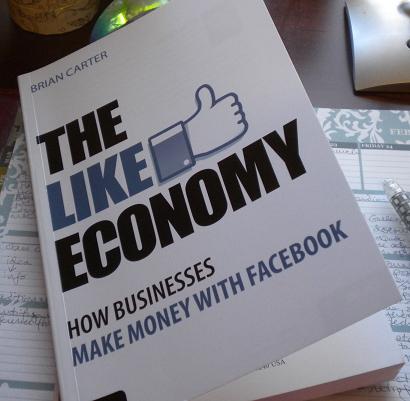Your cart is currently empty!

The Like Economy
The Like Economy: How Businesses Make Money With Facebook by Brian Carter is just exactly what it sounds like it is: a book on how to make promote your company on Facebook.
Facebook is a bit of a quandary for businesses. Facebook gives you theoretical access to one of the largest potential audiences in the world, since there are over 800 million users. You have to be there, because your customers will look for you. Facebook can send traffic — twice or thrice as much, according to Carter, as Twitter. Advertising at Facebook is cheaper than most other online advertising options.
Carter also makes an interesting point about Facebook: it’s skewed toward positivity. You can “Like” but not “Dislike” posts, and positive posts get more likes so they draw more attention. People are very enthusiastic at Facebook and go around expressing their love for things with a wanton perkiness that you just don’t see in the physical world.
On the other hand, we haven’t seen much actual success at Facebook. A few of the examples of Facebook use I’ve personally seen among clients:
- A company spending thousands of dollars on Facebook ads, getting lots of fans, and selling nothing because the fans were, for the most part, high school students and not the target audience.
- A company interacting well with Facebook and getting lots of expressions of love and pretty good traffic, but one of their lowest conversion rates.
- A company engaging visitors well at Facebook and getting twice the traffic as from Twitter — but also twice the bounce rate and half the pages per visit.
Carter points out — as I have, and probably everyone else who writes about this subject — that you may be getting people’s attention on Facebook and then having them come to your site via search or direct traffic, so you simply can’t measure the effect of your company’s Facebook page.
But he also suggests that companies that don’t do well from Facebook are probably doing it wrong. Some of the things Carter says you need to do to succeed with Facebook:
- Advertise. Carter is pretty clear that Facebook for business isn’t free. You should plan to advertise to gain fans, he says, before you can expect to do anything else.
- Target your ads and all your content well. Carter points out that you aren’t a good example of your target customer (“If you have power in a company,” he says, “you are, by definition, strange. And I mean that in the very best way.”). You should therefore quit thinking that you are the person you’re writing for. Find out about your actual customers and aim your marketing toward them.
- Test and analyze your data.While Carter discusses at length the factors that keep Facebook from being 100% measurable, he also has a lot of good advice about testing and tweaking your efforts. If you don’t test and track, after all, you don’t know how you’re doing.
There are many sections of the book that cover things marketers may already know (AIDA, for example), but there are also some Facebook-specific tips that were new to me. Here’s my favorite: make your ad’s call to action be a phone call to you so you get all those free impressions and few paid-for clicks.
I’m not convinced that Facebook is going to be a marketing powerhouse for most companies. As a recent Forbes article comparing Pinterest’s track record with Facebook’s said, “Pinterest shows that if your business is selling stuff, a social network of stuff beats a social network of people.” We have a Facebook page for our company, but we know that people don’t decide they need to improve their web presence and mosey over to Facebook to look for an expert.
We do have one client who’s very successful at Facebook. They’re in entertainment, they have close to 14,000 fans, they greet visitors with pictures of scantily-clad women and — while they don’t advertise on Facebook — they do pay people to spend hours inviting friends to their events. People do go to Facebook to see what’s going on that night, they enjoy social invitations from friends, and this company’s target demographic probably also looks at pictures of girls for fun.
When I went to Facebook to check their numbers, I saw that a friend of mine had sent me an “invitation” that had something to do with a grocery store. While I wouldn’t normally click on this, I did for the sake of this post. I find that people who invite 50 friends will get a $100 voucher from the store. In other words, my friend was paid $2.00 to pester me with an ad. Seems pretty typical for Facebook business promotion.
Basically, people are playing when they go to Facebook. They’re not doing chores, shopping, or thinking about business. They might like an invitation to a concert, but they don’t want an “invitation” to a grocery store.
If your business is suited to Facebook, though, and you’re willing to pay for ads as your first step, Carter’s book gives you a lot of very practical advice. It’s an enjoyable read and addresses a lot of things our clients wonder about, such as the value of contests and of welcome tabs. It also contains plenty of wise words on social media and marketing in general. If you want to explore Facebook marketing, this book is a good choice.
[Disclosure: The publisher of this book sent me a copy for review. I am not paid for reviews, and you know I always tell you the truth.]

Leave a Reply